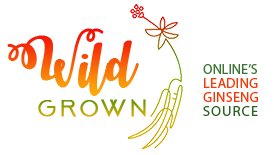Perhaps the second biggest pest problem associated with ginseng is thievery. Poachers may visit ginseng plantings and simply help themselves when the owner is not around. Growers are advised to investigate security issues before planting.
Ginseng is also attacked by fungal diseases. The most serious diseases of ginseng are leaf and stem blight caused by Alternaria panax and root rot caused by Phytophthora cactorum. Both diseases are controlled somewhat by commercial fungicides where legal. Both diseases may be seed borne so careful selection of seed sources is important.
Mice, chipmunks, gray and red squirrels will readily eat ginseng berries and seed, often before the berries even begin to ripen. Wild turkeys, ruffed grouse and songbirds may also eat berries in the forest. White tailed deer may occasionally eat foliage but ginseng is not a preferred deer food.
In addition to the two diseases mentioned above ginseng is also attacked by several other fungi and at least three species of insects. Once again it must be stated that prospective growers should become familiar with the rules and regulations regarding pesticide use before applying or even before planting.
Note: It will have far fewer problems of any sort if planted in appropriate locations using seed that is derived from healthy sources.

